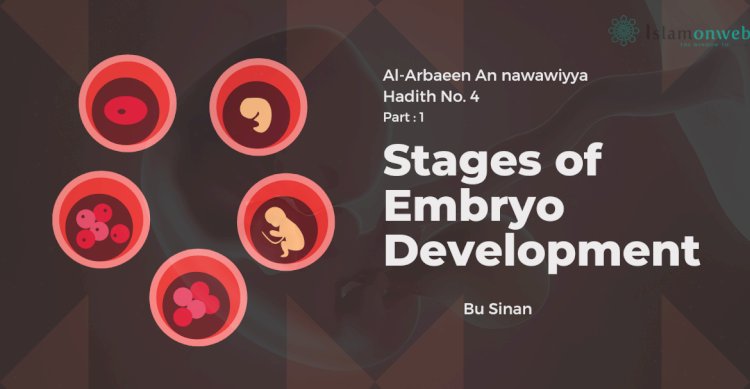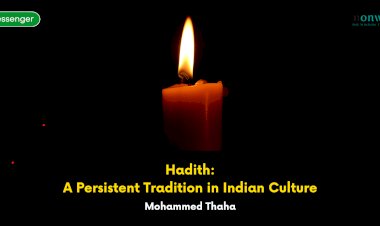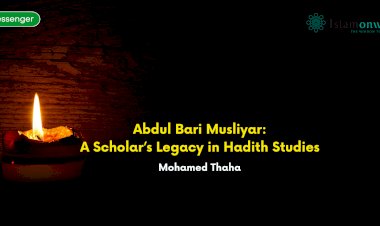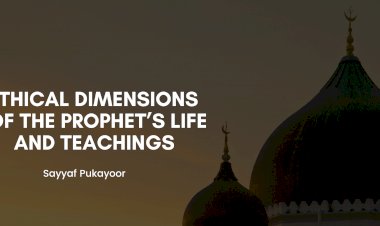Hadith No. 4 : Stages of Embryo Development
عَنْ عَبْدِ اللهِ بنِ مَسْعُوْدْ رَضِيَ اللهُ عَنْهُ قَالَ: حَدَّثَنَا رَسُوْلُ اللهِ ﷺ وَهُوَ الصَّادِقُ المَصْدُوْقُ :
" إِنَّ أَحَدَكُمْ يُجْمَعُ خَلْقُهُ فِيْ بَطْنِ أُمِّهِ أَرْبَعِيْنَ يَوْمَاً نُطْفَةً، ثُمَّ يَكُوْنُ عَلَقَةً مِثْلَ ذَلِكَ، ثُمَّ يَكُوْنُ مُضْغَةً مِثْلَ ذَلِكَ،ثُمَّ يُرْسَلُ إِلَيْهِ المَلَكُ فَيَنفُخُ فِيْهِ الرٌّوْحَ، وَيَؤْمَرُ بِأَرْبَعِ كَلِمَاتٍ: بِكَتْبِ رِزْقِهِ وَأَجَلِهِ وَعَمَلِهِ وَشَقِيٌّ أَوْ سَعِيْدٌ. فَوَالله الَّذِي لاَ إِلَهَ غَيْرُهُ إِنَّ أَحَدَكُمْ لَيَعْمَلُ بِعَمَلِ أَهْلِ الجَنَّةِ حَتَّى مَا يَكُوْنُ بَيْنَهُ وَبَيْنَهَا إلاذِرَاعٌ فَيَسْبِقُ عَلَيْهِ الكِتَابُ فَيَعْمَلُ بِعَمَلِ أَهْلِ النَّارِ فَيَدْخُلُهَا، وَإِنَّ أَحَدَكُمْ لَيَعْمَلُ بِعَمَلِ أَهْلِ النَّارِ حَتَّى مَايَكُونُ بَيْنَهُ وَبَيْنَهَا إلا ذِرَاعٌ فَيَسْبِقُ عَلَيْهِ الكِتَابُ فَيَعْمَلُ بِعَمَلِ أَهْلِ الجَنَّةِ فَيَدْخُلُهَا"
رواه البخاري ومسلم
On the authority of ʿAbdullah ibn Masʿūd (may Allah be pleased with him), he said: The Messenger of Allah ﷺ, who is al-ṣādiq al-maṣdūq (the truthful and the believed), narrated to us:
"Indeed, the creation of each one of you is brought together in the womb of his mother for forty days as a drop of fluid (nutfah), then it becomes a clinging clot (ʿalaqah) similarly, then it becomes a lump of flesh (muḍghah) similarly. Then Allah sends an angel to it, and he breathes the soul into it, and he is commanded with four things: to write down its provision (rizq), its actions (ʿamal), its lifespan (ajal), and whether he will be wretched or blessed. By Allah, besides whom there is no deity, one of you may perform the actions of the people of Paradise until there is only a cubit between him and it, but then the decree overtakes him, and he performs the actions of the people of the Fire, and thus enters it. And one of you may perform the actions of the people of the Fire until there is only a cubit between him and it, but then the decree overtakes him, and he performs the actions of the people of Paradise, and thus enters it."
Narrated by Al-Bukhari and Muslim.
About the Narrator
Abdullah ibn Mas'ud (may Allah be pleased with him) was one of the earliest converts to Islam, becoming Muslim in Mecca and was among the first six believers. He hailed from the Hudhail tribe and worked as a shepherd before Islam. Ibn Mas'ud had a special relationship with the Prophet Muhammad (peace and blessings be upon him), being his close confidant and known as the keeper of the Prophet's secrets.
Abdullah ibn Mas'ud accepted Islam early on in Mecca when the Prophet ﷺ passed by him while he was herding sheep for Uqbah bin Abi Mu'ayt. The Prophet asked him for some milk, but Ibn Mas'ud, out of trust for his employer, refused, stating that the sheep were not his. The Prophet (peace be upon him) then asked for a sheep that had never been milked, which he blessed, and milk flowed from it. This miracle played a significant role in Ibn Mas'ud's admiration and love for the Prophet.
He migrated to Abyssinia and later to Medina. He participated in the Battle of Badr, the Treaty of Hudaybiyyah (Bayʿat al-Ridwan), and all other significant events alongside the Prophet.
Abdullah ibn Mas'ud had the unique honour of serving the Prophet closely. He carried his sandals, purified him, and even shielded him when bathing. His closeness to the Prophet made him privy to many of the Prophet’s personal moments, earning him the title of Sahib al-Sirr (the keeper of the Prophet's secrets).
Ibn Mas'ud was well-versed in the Quran and was known for his exceptional recitation and understanding. The Prophet ﷺ himself once said, "Take the Quran from four: Abdullah ibn Mas'ud, Salim, Mu'adh, and Ubayy ibn Ka'b." His interpretations and recitations became widely regarded, and he taught many of the Companions.
Despite his physical stature being short and lean, the Prophet (peace be upon him) praised Ibn Mas'ud’s strength and virtue. When the Companions once laughed at the thinness of Ibn Mas'ud’s legs, the Prophet (peace be upon him) said, "By Him in whose hand is my soul, his leg will be heavier on the scale on the Day of Judgment than Mount Uhud."
During the Caliphate of Umar ibn al-Khattab, Ibn Mas'ud was appointed as the governor of Kufa, where he served both judicial and administrative roles. He continued in this capacity during part of Uthman’s reign before returning to Medina, where he spent his final years.
Ibn Mas'ud narrated 848 hadiths, many of which are included in Sahih al-Bukhari and Sahih Muslim. He was regarded as one of the most knowledgeable companions regarding the Sunnah and hadith.
Abdullah ibn Mas'ud passed away in 32 AH at the age of about 63-65 years. He is buried in Al-Baqi Cemetery in Medina, where his funeral was conducted at night, following his wish that Az-Zubair ibn al-Awwam lead his funeral prayers.
Introduction of the Hadith
The phrase used by Ibn Mas’ud, “The Messenger of Allah ﷺ narrated to us, and he is the truthful and the believed” (means truthful in what he says and is believed and trusted by others), is a deliberate introduction to this particular hadith. Although the Prophet ﷺ is inherently truthful, Ibn Mas’ud emphasizes this quality here to prepare listeners for a significant revelation that requires a high degree of affirmation and trust.
In this hadith, the Prophet describes the stages of human creation within the womb—a topic that, in his time, would be beyond human observation or scientific discovery. The Prophet (peace be upon him) had no exposure to laboratories, anatomy studies, or any form of medical training, nor did he use tools like x-rays to see inside the womb. Yet he accurately describes the early formation of a human being, which confirms that his knowledge is divinely revealed, as Allah Himself has said in the Quran: “And he does not speak from his own desire. It is but a revelation revealed” (Surah An-Najm, 53:3-4).
Thus, Ibn Mas’ud’s phrase “the truthful and the believed” serves to remind listeners that this knowledge could only come from divine revelation. It emphasizes the Prophet's authenticity in narrating truths about the unseen and reinforces the trustworthiness of his words, particularly when he speaks of matters known only to Allah.
The hadith explores the stages of human creation, detailing the transformation of the embryo within the womb in three phases—nutfah (a drop of fluid), ‘alaqah (a clinging clot), and muḍghah (a lump of flesh), with the soul being breathed into the fetus at the end of this period. This hadith emphasises both the biological and spiritual aspects of human development. The first three stages of nutfah, ʿalaqah, and muḍghah correspond to the early physical development of the fetus. The narration transitions from the material formation to the divine decree, where the angel is commanded to breathe the soul and inscribe the fetus's destiny, including its lifespan, provision, and fate. This connection between the physical and metaphysical highlights the comprehensive nature of creation in Islam.
Stages of Embryo Development
The three stages of human embryonic development, as described in the hadith, are nutfah (drop of fluid), ʿalaqah (clinging clot), and muḍghah (lump of flesh). In the first stage, the nutfah, the fertilized fluid is conceived and remains in the womb for an initial period, undergoing essential early development. This is followed by the ʿalaqah stage, where the embryo is described as a clot, which attaches to the uterine wall and begins to draw nutrients from the mother, signifying a stronger connection and continued growth. The final stage, muḍghah, represents a small, chewed-like lump of flesh as the embryo starts to form a rudimentary shape and initial features.
These stages, each lasting approximately forty days according to traditional interpretations, outline a sequential process of development that marks the gradual transition from simple fluid to a more defined form, preparing for the subsequent stages of human formation. As per this interpretation, it takes 120 days to complete all these three stages.
After this 120-day period, the angel is sent to breathe the soul into the fetus and decree four things: provision (rizq), actions (ʿamal), lifespan (ajal), and fate (whether wretched or happy).
The understanding of the stages of human creation as described in the hadith narrated by Abdullah ibn Mas'ud, found in both Sahih al-Bukhari and Sahih Muslim, is based on the interpretation of the phrase "Mithla dhālika" (meaning "similar to that" or "same like that"). While the hadith does not explicitly state "120 days," the use of this phrase for the second and third stages has been interpreted by scholars as 40 days each, making the total duration 120 days before the soul is breathed into the fetus.
However, there are some other narrations of hadith that give different time frames for the fetus's development. Different narrations in Sahih Muslim mention 40, 42 and 45 days as the period for sending the angel to shape the embryo, forming its hearing, sight, skin, flesh, and bones. The angel then asks Allah to decree the gender, lifespan, provision, and fate.
"In Sahih Muslim, on the authority of Hudhayfah ibn Asid, the Prophet Muhammad (peace and blessings be upon him) said: 'When 42 nights have passed after the sperm-drop (nutfah), Allah sends an angel to it, who shapes it, creates its hearing, sight, skin, flesh, and bones. Then the angel says: "O Lord, will it be male or female?" And your Lord decrees what He wills, and the angel writes it down. Then the angel says: "O Lord, what about its lifespan?" And your Lord decrees what He wills, and the angel writes it down. Then the angel says: "O Lord, what about its provision?" And your Lord decrees what He wills, and the angel writes it down. Then the angel goes out with the scroll in hand, and nothing will be added to or subtracted from what was commanded.'" (Sahih Muslim)
Harmonising the Hadiths:
Imam Nawawi in Sharah Muslim says: The statement of the Prophet (peace and blessings be upon him) in this hadith, "Then the angel is sent," appears to indicate that the angel is sent after 120 days. In a subsequent narration, it mentions that the angel comes to the nutfah (drop of fluid) after it settles in the womb for forty or forty-five nights and says, "O Lord, will this be wretched or happy?" Another narration specifies: "When 42 nights have passed over the nutfah, Allah sends an angel to shape it, creating its hearing, sight, and skin."
In Hudhayfah ibn Usaid’s narration, it is stated that the nutfah stays in the womb for 40 nights, after which the angel approaches it. Another narration adds that an angel assigned to the womb asks Allah after forty-some nights. In Anas’s narration, it is mentioned that Allah appoints an angel to the womb who says, "O Lord, a drop (nutfah), then a clot (ʿalaqah), then a lump of flesh (muḍghah)."
Scholars reconciled these narrations by explaining that the angel remains with the nutfah and observes its progression. The angel says, "O Lord, this is a clot," or "This is a lump of flesh," at the respective times. Thus, at each stage, the angel states what the substance has become by Allah’s command, and Allah is All-Knowing. The angel's role involves multiple stages: first, when Allah creates it as a nutfah, then transitions it to a ʿalaqah, at which point the angel first recognizes it as a potential offspring—since not every nutfah becomes a child. This occurs after the first forty days when the angel then writes down its provision, lifespan, deeds, and whether he will be blessed or wretched.
Comparison to Modern Embryology:
In modern embryology, by 42 days (6 weeks), the fetus is undergoing significant development, with the formation of the neural tube, heart, and other vital organs. This aligns with the hadith from Hudhayfah ibn Asid, where, after 42 days, the angel is sent to shape the fetus’ physical features.
Ibn Zamalkani, in his work Al-Burhan al-Kashif ʿan Iʿjaz al-Qurʾan (The Clear Proof of the Miraculous Nature of the Quran), harmonised theological and scientific understandings, focusing on the stages of fetal development as outlined in hadith and the Quran.
He is a renowned scholar, linguist, and shafie jurist, born in 667 AH (1269 CE) and passed away in 727 AH (1327 CE). Al-Dhahabi described him as highly intelligent, knowledgeable in Islamic jurisprudence and Arabic, and known for his quick reading.
Ibn Mas'ud’s hadith suggests that the fetus progresses through three stages—nutfah (drop), ʿalaqah (clot), and muḍghah (lump)—each lasting forty days. However, Hudhayfah’s hadith implies that formation begins earlier, specifically after 42 days. Ibn Zamalkani reconciles these differences by relating them to anatomical findings of his time, which indicated that significant embryonic development and organ differentiation begin around 42 days.
He noted that scholarly disagreement in reconciling these hadiths stemmed from limited anatomical knowledge available at the time. He stated, “I will explain the stages of the nutfah in the womb and align it with the hadith so that both match reality, as the best transmitted knowledge is that which aligns with reason.” In line with contemporary anatomical understanding, Ibn Zamalkani concluded that all three stages—nutfah, ʿalaqah, and muḍghah—are completed within the 42-day period described in Hudhayfah’s hadith, suggesting Ibn Mas'ud’s hadith should be interpreted accordingly.
The phrase "and He created its hearing and sight" relates to the intermediate developmental stages, during which the embryo transforms from a ʿalaqah (clot) to a muḍghah (lump) and then bones clothed with flesh. Ibn Mas'ud’s hadith uses "gathering in the womb" to imply the perfection and completion of creation. The phrase "ثم يكون علقة مثل ذلك" ("then it becomes a clot similarly") emphasizes the precise and structured development of each stage, with nutfah and ʿalaqah stages both reflecting careful progression and refinement.
The phrase "مثل ذلك" ("similar to that") here is interpreted to denote the quality of precision and completeness in each stage rather than indicating identical durations. Alternatively, “similar” could be an additional word functioning as a reference to the period, to mean “then it becomes a clot in that time.” Ibn Zamalkani also cites examples from the Quran and hadith to illustrate this usage.
The Noble Quran also explains the stages of embryo development without mentioning any time frame. Quran says: “And certainly did We create man from an extract of clay. Then We placed him as a sperm-drop in a firm lodging. Then We made the sperm-drop into a clinging clot, and We made the clot into a lump [of flesh], and We made [from] the lump, bones, and We covered the bones with flesh; then We developed him into another creation. So blessed is Allah, the best of creators” (Al-Mu’minun, 23:12-14).
Observations from medical science support this interpretation and seem more logical. As Imam Zamalkani said, other hadiths on this should be explained based on this hadith.
The remaining parts of this Hadith will be explained in the next part.
Disclaimer
The views expressed in this article are the author’s own and do not necessarily mirror Islamonweb’s editorial stance.
8 Comments
-

-
-

-

-

Web Desk
7 months ago
It is not clear what you mean. The issue of 120 days is discussed in this article, and accordingly, the author states that the 42-day hadith report is more accurate, as described by Ibn Zamalkani, and other hadith narrations should be interpreted accordingly.
-
-

























Leave A Comment